12/12/2005
Iranian Futsal
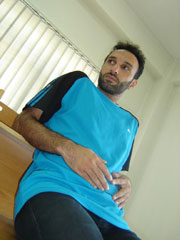 Interview by our iranian collaborator Mahdiar GhaffariSpecial thanks to Steve Harris & Futsal NaviReza Heidarian, from aspiring artist to king of Asian futsal... "Neither money nor fame interest me -- I just want to enjoy my life." ProfileDate of Birth: 1974-02-17 Place of Birth: Tehran Marital Status: Single He has three sisters and one brother, none of whom is an artist or athlete. First Cap: Tiger 5s Cup 1997, against Italy. Number of Caps: around 100. International goals: around 60 Clubs: Esteghlal Tehran, Ceccano (Italy) Honours: 7 times Asian Futsal Championship winner, 2 appearances in Futsal World Championship, 2 times third-place in the Tiger 5s, 3 times winning the Iranian League with Esteghlal, 2 times winning the Ramadan Cup with Esteghlal, 3 times selected the most valuable player of the Asian Futsal Championship His friends say his behavior has never changed over the years. Reza is the only Asian man who has held the Asian Cup as a captain, and he has done it seven times. But he's still as friendly as before. Though calm and taciturn on the pitch and uncommunicative with the media, in person one could hardly meet a more friendly and straightforward gentleman. Also surprising is that this famous magician of Asian futsal leads a very simple life. He still lives at his childhood area, Jeyhoon street in east Tehran, rides his own motorcycle, and is interested in learning about new art forms. Even at the expense of his fledging career in Italian futsal, he devoted himself to learning how to be a caricaturist from an Italian artist whose patience was apparently tried! One of the most educated players of Team Melli. Reza met us at the Sports Department of the University of Tehran (UT), where he got his license degree in physical education years ago. Now he plays for an Italian futsal side located in Ceccano, a very small town close to Rome, Italy, but he still spends a lot of time with his university mates and childhood friends when back home in Iran. First of all, tell us why did you start playing futsal? I began so late. I think I was 12 or 13 years old when my feet touched the ball for the first time, just by accident. The children were playing Gol Koochik (Iranian version of football that is usually played 3 to 3, with plastic ball and small goals) in the schoolyard during the break. Like always, my friends and I were sitting around talking. One of their players got injured, so they came to us and asked if one of us could play with them. It was when I started playing football for the first time. I played well and developed a very strong interest that soon became a passion. I played Gol Koochik a lot. Later, when I became older, I participated in some local indoor soccer cups. It was 1995, when I was 22 years old, that Ali Mansourian (Iranian ex-national player in France 1998, who has also played matches for futsal team in the WC1996 qualifying round) introduced me to an Iranian team that was going to Abu-Dhabi to participate in a futsal tournament. I went there and ended up top scorer and most valuable player. Two months later I joined Ali Mansourian at Esteghlal club, to participate in a 4-a-side tournament.So you'd never played for a futsal club before the age of 22? No. It was my first time. We met the national team in that tournament and I played very well against them. From then, I was invited to Team Melli and became a key player for Esteghlal. And you remained with Esteghlal? Yeah, I remained with Esteghlal till 2003, when I moved to Italy. When did you make your debut with the national team? And how many titles have you got with Team Melli? It was in the Tiger 5s in 1995, against Italy. After that we won seven Asian Cups, participated in two world championships, and two times won third-place at the Tiger 5s.During these years, which country has been your main Asian rival? Totally Japan, from the first time till now. I can still remember the Asian Championsip in Ď99, when Japan was 2-0 ahead against us in the first half. It was in semi-final, which we somehow won 5-3. Then Brazilian Rui Ramos was one of their players. Japan has been always our main rival, although in the Asian Championship held in Thailand we had a lot of problems against Kazakhstan in the final match.Have has Asian futsal changed over the course of the seven Asian championships that you have been in? Everything has changed. Before, more teams were playing very statically, but now you can see a lot of rotations and movements in Asian teams. Japan especially has improved very well, and in the last three years Thailand as well. Now every team pays more attention to defensive tactics, which is great. For example, I think that Japanese are very strong when they defend, but they have problems in attacking and scoring. They have good rotations but it's very easy for the opponents to defend against them.You once said about Japan the distance between them and Iran was shrinking. Then at Vietnam 2005 Iran finally lost to Japan. Had you ever expected to lose to Japan before it? I remember that before going in to the gymnasium an Iranian journalist came to me and asked about what I thought the result would be. I said, "I hope we can win the match. One-zero is enough -- the important thing is to win." Everybody knew that it'd be a hard match, but we didn't expect to lose.Did Iran work on its power-play in preparation for matches in which you lead but a goal or two? A little. Against Japan, we played with five outfield players for the last few minutes but they defended very well.And you were the goalkeeper in those minutes. You had some opportunities to shoot but you didnít, right?Actually we were not playing a formal 1-4 system in those minutes. Two other players were in the same line as me, so it was more akin to something like a 3-2 formation. I had some opportunities in which I faked shooting and instead passed the ball on to other players. This created two or three excellent opportunities for my teammates because the goalkeeper was caught off-guard, thinking the shots would come from me. Unfortunately, none of those finished with a goal.What were the differences between two matches against Japan? Did you change your plans for the second match?In the first match, we were in a hurry to score and ended up getting scored on the break. We attacked again to equalize, but they scored another goal. It caused mental problems in the team. But in the second match we tried to play with more concentration. We scored two early goals that helped us so much because those put us ahead. We played well in both attack and defense. I think Japan played with five outfield players for about 12 minutes, but we defended very well in those minutes. I believe that the power-play was a big mistake for them because we had committed five fouls and certainly it would have been easier for them to try to win a double-penalty. But it was easy to defend against them on the power-playHow did the staff and players of Iran feel after losing to Japan and then drawing with Thailand? Well, everybody was sad. I had to tell them, "You don't know what you've lost yet." Japan really played fair.Do you think Japan should have eliminated Iran by intentionally losing to or drawing with Thailand? It all came down to a matter of their philosophy. Maybe one coach would prefer to not face Iran in the final match, while another coach might say that his team can beat Iran again.What's your own opinion? Did they make a mistake?I think yeah, they made a mistake. There are teams that are going to be able to beat even Brazil or Spain on the odd occasion, but they should not assume that they can easily repeat that win again.And that's what Brazil, Spain or Italy seldom do.Yeah, you saw in Ostrava 2005 that Spain intentionally lost to Italy just to get an easier opponent in the semi-final. Anyway, it depends on the philosophy of the coach.Do you think Japan would do the same thing if faced with the same situation in the future?It's unlikely.What about if Iran had the opportunity to eliminate Japan by getting a draw against Thailand? Would they eliminate Japan in the group stage in that manner?According to what I know about this team, we would try to win.But you said the Japanese made a mistake.Yeah, but Iran had a consecutive winning record in Asia and we didn't want to lose it.Now that you've lost it, will Iran feel comfortable enough to lose in order to eliminate its main rival before a final? Now it depends on the coach. Even our coach didn't expect that Japan would win against Thailand. Everybody was ready to come back to Iran. It was unbelievable for us.How do you see the future of Iranian futsal in Asia? It's becoming harder and harder day by day because many countries are working hard. Over the last few years even Brazil has started losing to Spain in different tournaments -- Brazil, which is the birthplace of futsal. It means that technique is not enough. If we want to improve our futsal, we have to invest in our youth systems. We were fourth-place in Hong Kong at the 1992 World Championship. Since that time we have done little to build up our futsal infrastructure. The players still come to futsal at advanced ages. The managers have to better tailor the program for children and young players. I mean futsal players, because there are a lot of differences between futsal technique and football technique. But with the current situation that exists even in our premier league, we are not going to improve. We lack physical strength, speed, techniques and tactics. In Japan, it's said that Iran won't be a strong rival for Japan after Shamsaee and Heidarian retire. Do you agree? It's what also what they often say in Iran as well. I believe that there is a lot of talent in Iran, but the problem is that there is no system to discover and nurture this talent. A young footballer doesn't know where he had to go to begin his futsal career. Should this situation continue, our futsal will become weaker and weaker. But if they invest in our youth systems, many Vahids and Rezas will be found.You've played many years next to Vahid both at Esteghlal and Team Melli, where youíve been known as the most dangerous pair in Iranian futsal. Tell us about Shamsaee. He's a great player. In these years we've gotten to know very well how each other plays. I know when he needs the ball and when he decides to pass to his teammates, and he knows how and when I send my passes. We've played always together in the national team, except for two periods of time. In Thailand Asian Championship, I was in the group that played a 4-0 system and Vahid was in the group that played a 3-1, so we were not playing together. The same thing was repeated more or less in Tehran 2001 when Vic Hermans was in charge.You've worked with many coaches in the national team: Hosein Shams, Vic Hermans, Ansarifard, and Jurandir. What are your thoughts on the last one? Jurandir knows futsal very well, and he tries to transfer all he knows to his players. He pays much attention to the corner kicks and free kicks. I think that's so important because at the highest level of futsal the teams score many goals from set pieces. He needs time to prove himself. Jurandir had no experience in this level. Does that make problems for Team Melli? Jurandir who comes from Caxias do Sul, is one of those trainers who know futsal very well. Then there are others who know coaching very well. The latter are coaches who have a good perspective on the match and usually are more effective at substituting, like Lozano or Nuccorini. Jurandir still has weaknesses in making important decisions and substituting effectively during the match. I think he needs a good assistant who can help him with this. Our physical trainer Picoli was the man who did this job in Vietnam. He's an intelligent man with a great command of futsal, although he's just a physical trainer. Iíve heard that Piculi has received an offer from Carlos Barbosa, but I hope he stays with us.Among the coaches that you've worked with at Team Melli, who has the best coaching ability during matches (in terms of decision making and substituting)? I believe that it was Vic Hermans. He did very well in the short two or three months that he was with us. He was not only a good coach, but also a good trainer and had very friendly relations with the players. He had a great ability to transfer his knowledge, thanks to his able translator.Except your technical skills, what makes you different from other players? Leadership. The problem of our players is that they only go to the pitch to do their personal role, and they don't pay attention to the other parts of the team. I try to be a good leader for my team. Reza Heidarian (Photo courtesy: Mahdiar Ghaffari - Futsal Navi) 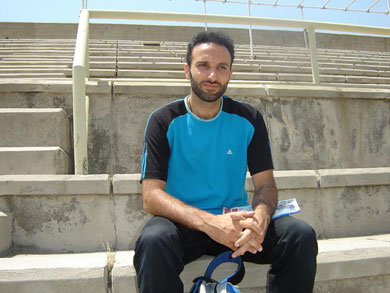 Reza Heidarian (Photo courtesy: Mahdiar Ghaffari - Futsal Navi) 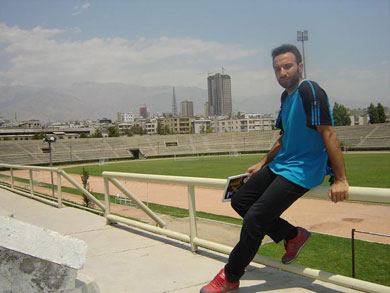 Reza Heidarian (Photo courtesy: Mahdiar Ghaffari - Futsal Navi) 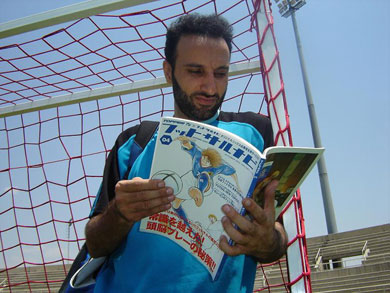 Reza Heidarian (Photo courtesy: Mahdiar Ghaffari - Futsal Navi) 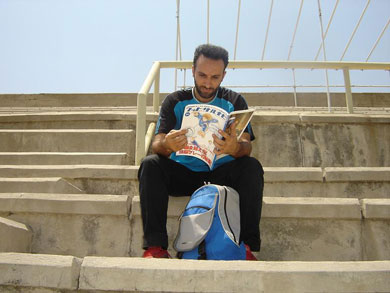 Reza Heidarian (Photo courtesy: Mahdiar Ghaffari - Futsal Navi) 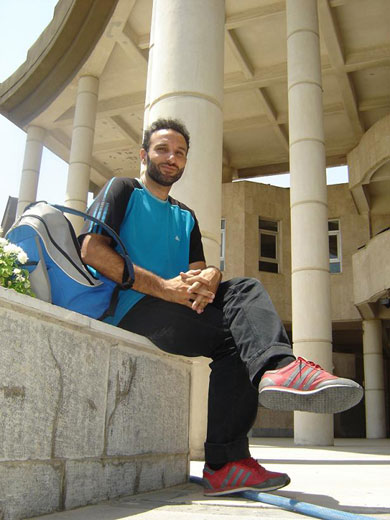 Posted by Luca Ranocchiari --> luca.ranocchiari@futsalplanet.com
|


